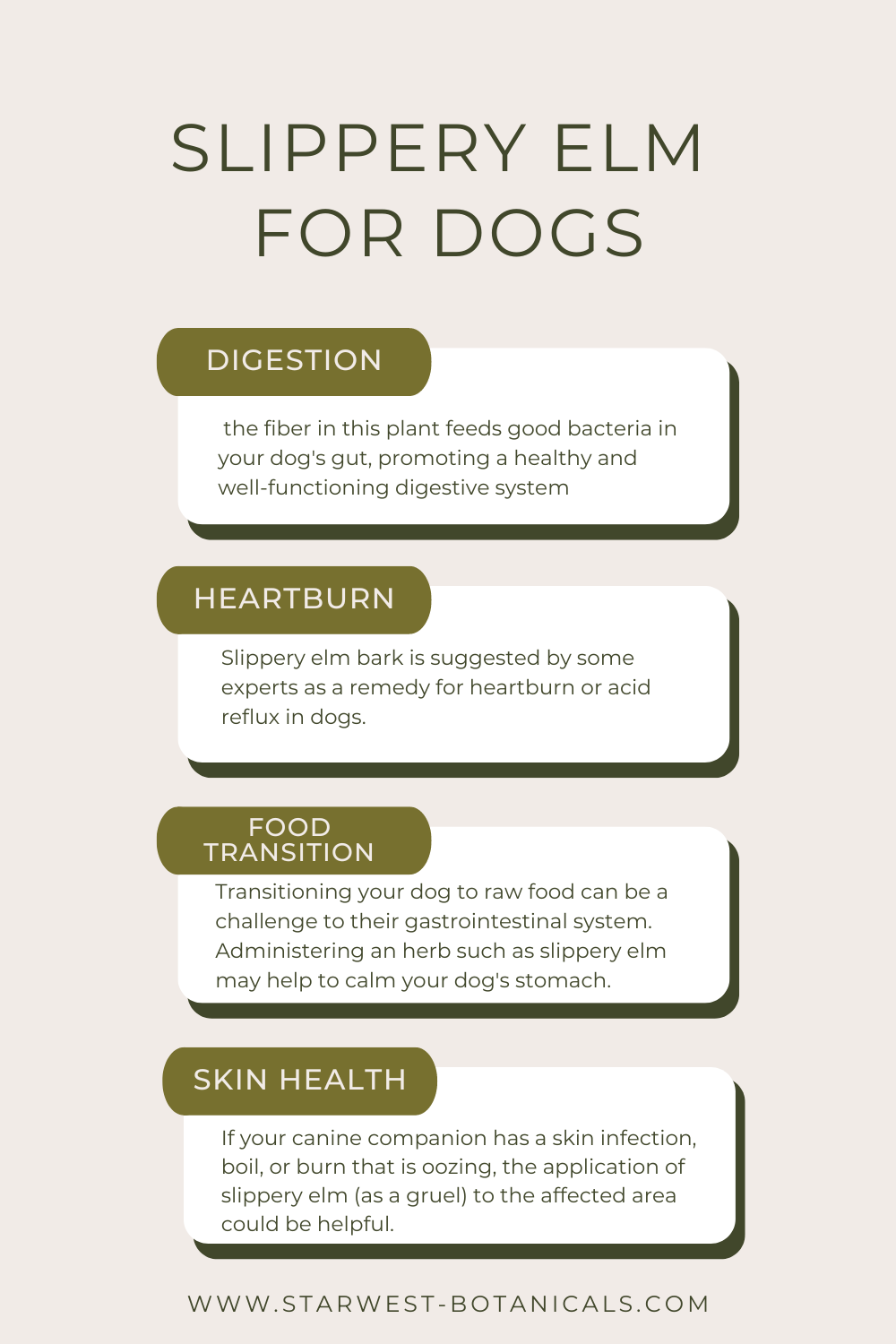Slippery Elm for Dogs: Everything You Need To Know | Starwest Botanicals
Posted by Daniel Powers on 06-21-2023

Slippery elm is a well-known herb that’s thought to provide a variety of different health benefits.
While this herb has benefits for humans, using slippery elm for your dogs is becoming a popular trend for animal lovers.
If you’re interested in learning about the health benefits of slippery elm for dogs, you’ll want to check out this helpful guide. If you’re already familiar with the benefits and looking for a source for organic slippery elm, look no further than our full selection of dried slippery elm here at Starwest Botanicals.
What is Slippery Elm Bark?
The Ulmus family of plants, commonly known as elms, includes Slippery elm, a tree with the scientific name Ulmus rubra.
One of the distinguishing features of Slippery elm is its bark, which is particularly rich in mucilage. This slimy substance is made up of polysaccharides and is known for its ability to soothe mucus membranes.
Because of its high mucilage content, Slippery elm is classified as a "demulcent," meaning it’s an herb that can provide a protective coating and soothing effect on body tissues. This benefit has been used to support both humans and animals, for hundreds of years.
Slippery elm bark has been widely used in Native American medicine, particularly for supporting digestive discomfort. In the herbal community, it is considered one of the most effective herbs for supporting digestive health.

Benefits of Slippery Elm For Dogs:
Below are the various health benefits of slippery elm for dogs.
1. Digestive Health
Slippery elm is helpful for a variety of digestive health ailments that plague dogs, including diarrhea, constipation, and more.
It may seem odd that slippery elm has the ability to help with both diarrhea and constipation. However, as with other fibrous plants, its primary function is to regulate the digestive system.
This can aid in the relief and prevention of constipation due to its soothing and laxative qualities. In cases of constipation, the muscles have to exert additional effort, but slippery elm can help by calming and lubricating the mucous membranes of the digestive tract, resulting in muscle relaxation.
Slippery elm also has astringent qualities, meaning it helps to tone tissue. This can help to promote digestive comfort.
Moreover, the fiber in this plant feeds good bacteria in your dog's gut, promoting a healthy and well-functioning digestive system.
2. May Help With Heartburn
Slippery elm bark is suggested by some experts as a remedy for heartburn or acid reflux in dogs.
Heartburn occurs when stomach acids flow back into the esophagus, leading to a painful burning sensation due to the damage to the esophageal lining caused by the acid.
Slippery elm's mucilage content provides a proactive coating that safeguards the esophagus against stomach acid and may help to alleviate heartburn.
3. Transition To Raw Food
Transitioning your dog to raw food is a big step that can be a challenge to your dog’s gastrointestinal system.
Administering a herb such as slippery elm can help to calm your dog's stomach and make the transition easier.
4. Skin Health
The astringent properties of slippery elm can cause tissue to dry and contract, which can be beneficial in drying out oozing wounds and promoting faster healing by stemming the bleeding.
If your canine companion has a skin infection, boil, or burn that is oozing, the application of slippery elm (as a gruel) to the affected area could be helpful.
To explore further the possible health benefits of slippery elm for humans, you may refer to our detailed article available at this link.
Is Slippery Elm Safe for Dogs?
Slippery elm is generally considered to be a safe herb for dogs. It’s non-toxic and doesn’t have any known side effects for canines.
As with all herbs, some dogs may have an allergy, so it’s best to start with a small dose and work up from there.
Because slippery elm powder contains mucilage, it is recommended to administer it separately from other medications. It's important to ensure that your dog receives their other medications at least 1 to 2 hours before giving them slippery elm.
How To Give Slippery Elm To Your Dog:
You can administer slippery elm to your dog either internal or externally.
For internal use, it's advisable to consult with your veterinarian. Slippery elm powder should be mixed with cold water to create a gruel-like substance. It's crucial to add enough water as this herb has the capacity to absorb several times its weight in water. Your dog should tolerate the sweet and mild taste of slippery elm well. You can also make slippery elm into a tea - just make sure to allow it to cool before giving it to your dog.
It's essential to check the quality of the slippery elm you are using to ensure its efficacy. Look for light grayish-tan herb with a mildly sweet taste. Here at Starwest Botanicals, we offer a variety of slippery elm powders for you to choose from.
For external use, and in particular with skin issues, create a paste from the slippery elm by combining it with water. Smear it onto the areas of concern: hot spots, scratches, rashes, insect bites, etc…. The application will form a natural bandage and will stay in place for several hours.
How Much Slippery Elm for Dogs?
The typical dosage of slippery elm powder for dogs is 400mg (or roughly ½ teaspoon) for every 10 lbs that your dog weighs.
For example, a 20lb dog would need 800mg (or roughly ~1 teaspoon) of slippery elm powder.
This powder should be mixed with cold water to create a slurry which can then be fed to your dog.
In Closing:
Adding slippery elm tea to your dog’s healthcare routine is a great way to support their digestive health.
As always, consult with your vet before adding a new herb to your dog’s diet
Here at Starwest Botanicals, we offer a variety of slippery elm products and wholesale pricing. Whether you’re looking for dried whole bark, powder, or slippery elm tea, we have you covered with our certified organic products.
Author Bio:
Daniel has a master's degree in herbal science from the Maryland University of Integrative Health. He's the founder of The Botanical Institute, where he writes about the health benefits of herbs.


